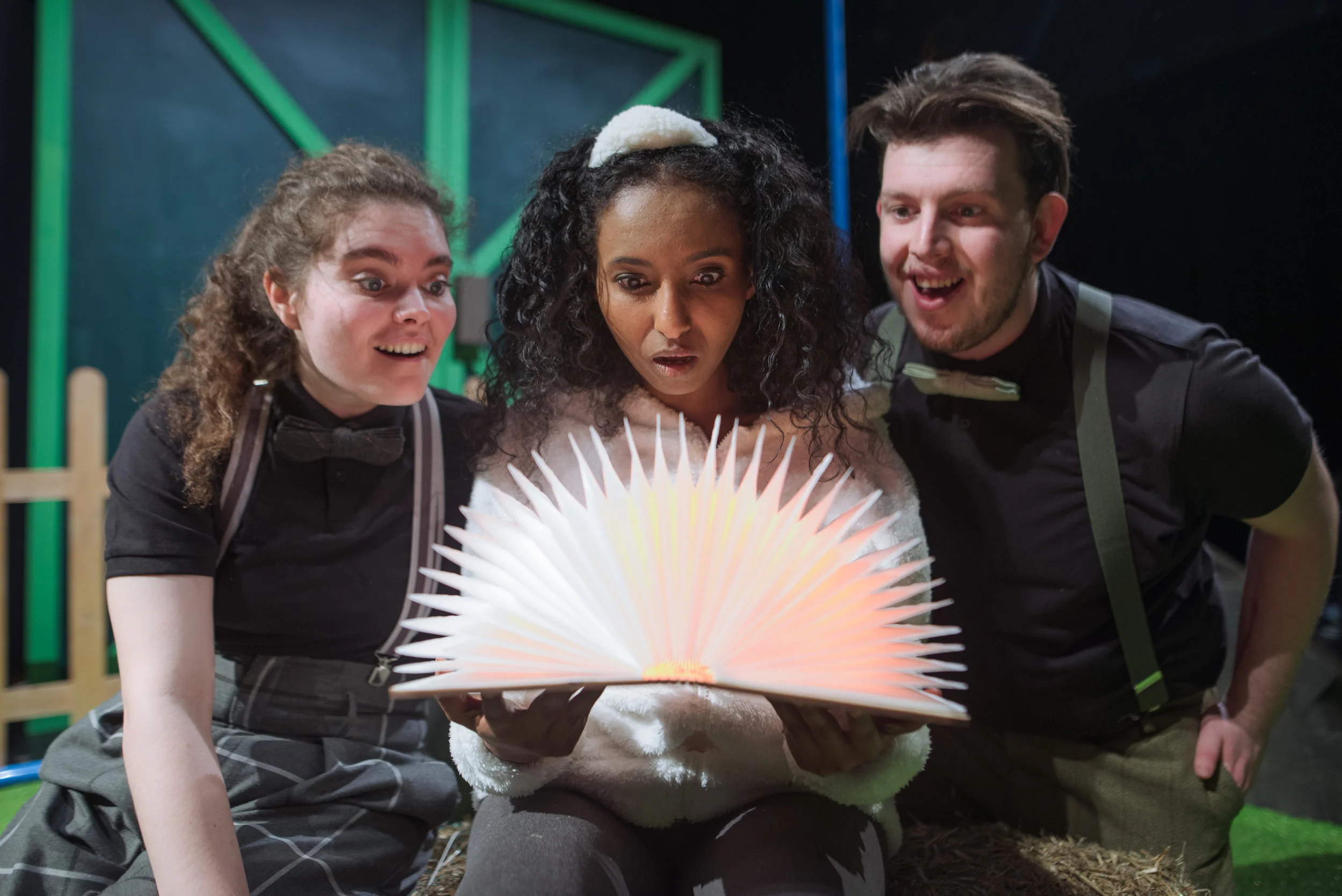Shay: And a very good afternoon. It’s Sunny and Shay on BBC WM 95.6. Now, a production aimed at young children with a difference is in Birmingham this weekend. It’s called Mathilda and the Orange Balloon which tells the story of a little grey sheep but in an accessible way. It’s being performed at Touchbase Pears in Selly Oak on Saturday and we’re joined now by Erin Hutching from the company The DH Ensemble. She’s one of the lead artists for the project. Erin, a pleasure to have you on the show.
Erin: Thank you very much for having me.
Shay: Now, what’s fantastic when we heard about Mathilda and the Orange Balloon, was that you very much are bringing a diverse cast of Deaf and hearing actors to the stage. Why have you decided to do this with a production like this?
Erin: So, our company The DH Ensemble focuses on making work for Deaf and hearing audiences but we come from a background of making innovative accessible theatre for adults. Our company has worked with the Royal Shakespeare Company and the National Theatre and companies like that but we’ve really realised there’s a huge gap in the market for shows which are accessible for young children of all backgrounds so we would really love to make our work accessible for children with disabilities and without disabilities. So this particular show has Deaf actors and a hearing actor performing in it, uses sign language, uses animation and it’s welcoming for children from all kinds of backgrounds.
Sunny: And what are some of the challenges that you face when you put performances like this on? Is it the older venues, the new venues, is it the individual theatres that you go to thinking “We won’t be able to get enough audience, people might be put off”? What are some of the challenges that you’ve faced so far?
Erin: I think it’s interesting because a lot of venues at the moment are wanting to open up their audiences and to program accessible work and to use things like sign language interpretation and captions but at the same time they do worry that that might not attract the audience that they already have at the theatre. We haven’t experience that being too much of an issue for us so far in our company’s work. We always try and make it really clear that our work is accessible at its heart to Deaf audiences but it is also made for a mainstream audience, so we sometimes have to be quite careful in our marketing just to make that clear that it is accessible to everybody (Sunny laughs) and that we are a professional company making professional work. So I think that’s been a little bit of a challenge for us is just to really get that message across that as much as we really value and applaud people who make amateur and community theatre that’s not the background that we’re coming from.
Sunny: Uh huh. And how do you pick the plays that you’re going to take on then? This script for this play in particular, how did you come to, as a company, thinking this is the one, this is going to fit really well in what we’re trying to achieve?
Erin: Well we were actually approached. So this is a co-production, an international co-production, with an artist from New York called Jess Kaufman. She was living over here in the UK for a while and saw our company’s work and this is a book that - it’s based on a children’s book Mathilda and the Orange Balloon by Randal de Sève - which she really loves and when she saw our company’s work she realised that it would be a perfect fit for this book because the story is about a search for identity, it’s about labels and it’s about telling children and adults that you can be whatever you want to be and don’t let society’s expectations put you in a little box. And she thought, “Well, that’s absolutely perfect for a company that really tries to celebrate diversity and difference.”
Sunny: And when you were going through the casting process and the script itself, has it changed much or was the script or the movement stayed the same with the actors that got involved?
Erin: Well, yeah it’s interesting when you’re working a lot with sign language. So we started from the story in the book and then Jess wrote a script but that was in English and we very much want to have bilingual productions. So then the work needs to be translated into sign language. But then sometimes you find that actually creating the story visually and using sign language as the original root language is more interesting.
Shay: I think this is just great, I’ve got to say, Erin, because the whole point of this is that it’s theatre which is accessible for all. If you are deaf then that’s covered for you and if you’re not well then that’s also covered for you. It’s that whole idea of inclusivity rather than exclusivity. What has the feedback been like from parents, you know, perhaps even from children as well, with the shows?
Erin: It’s been wonderful. It’s been so lovely to see how enamoured the children are with the story and with the actors and parents have given us really great feedback. A lot of deaf parents have said that they really wish they’d had something like this when they were younger and a lot of parents who have children who are not deaf or disabled have just said how wonderful it is for their children to be exposed to that at a young age because it’s so important that you know, we all realise that everybody’s different and you meet as many people as possible when you’re young and it really opens up your mind. So, yeah we’ve had brilliant feedback from it. At the end the children get to go on the set and meet the actors -
Shay: Brilliant!
Erin: - and become part of Mathilda’s world and they love that. They absolutely love it.
Shay: Now, The DH Ensemble, it stands for The Deaf and Hearing Ensemble -
Erin: That’s right.
Shay: For anyone who’s not too sure who’s thinking what does that actually stand for.
(All laugh)
Shay: Why did you yourself personally get involved in this? Have you been affected, are you affected rather, have you had experience of either deafness or hearing - or what was it that made you think, “I need to be a part of this company”?
Erin: Well my sister is deaf so I grew up using sign language from when I was a baby so I learnt to sign as I learnt to speak and I’d been working professionally as an actor for a number of years when I moved to the UK and I hadn’t ever used sign language in my work at all. But I decided to write a play about my sister and our experiences and my family’s introduction to sign language because my parents were given the advice that many parents were given in the 80s not to use sign language because they said it would stop a child from being able to learn to speak which we now know is not the case and has led to a lot of language deprivation amongst deaf children and deaf people -
Sunny: Right.
Erin: I wrote a play about that and came across The DH Ensemble which was already an existing company and they were really interested in making it with me. So I was lucky enough to get involved and then be invited to become one of the Lead Artists of the company. The other artists that we work with are two Deaf actors called Stephen Collins and Sophie Stone who both appear a lot in main stage productions - Sophie’s on the West End at the moment and she’s been in Doctor Who - and we also have a director called Jennifer Bates who is probably the only person who has come from a background where she didn’t grow up knowing somebody who was deaf but just came to it through a series of coincidences and a real passion for learning the language which I really admire among people when they just want to learn sign language and go ahead and do it.
Shay: I think it’s going to be a great show and I love the fact that it’s interactive and the kids get to come on and be part of it all as well - the world of Mathilda and the Orange Balloon. Such a pleasure having you on the show Erin. You’re going to be as we mentioned before performing at Touchbase Pears in Selly Oak on Saturday 25th May. The website is dhensemble.com is the website. Thanks again for joining us today.
Erin: Thank you so much.
Mathilda and the Orange Balloon is at Touchbase Pears, Selly Oak, Birmingham on Saturday 25th May

